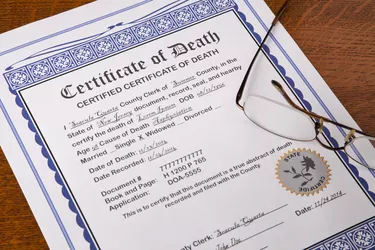
Death is a sad and stressful time for families of the deceased. The emotional toll that comes from a sudden void in the family is hard to bear. Meanwhile, it's necessary to perform all sorts of housekeeping from funeral arrangements to notifying financial institutions to making insurance claims. In addition, the estate must be properly distributed according to the wishes of the departed.
If that is not enough, an income tax return must be filed with the Internal Revenue Service (IRS) if income was received during the year in which the death occurred. This begs the question: Do you send a death certificate to the IRS?
Video of the Day
Video of the Day
Should the Departed Pay Taxes?
Do you need to file taxes on a deceased person? Morbid as it may sound, the answer is yes. By law, the government has the same claim on income earned as if the person were still living. If taxes are owed, the survivors must pay them.
In the same way, the IRS owes money to the estate if a refund is due. Of course, without the taxpayer present, the responsibility of filing falls to those who are the responsible stewards of the estate.
By law, the government has the same claim on income earned as if the person were still living.
What Is the Filing Procedure?
Before any preparations for the upcoming tax filing, the first step is to determine the point person for the task. This may have already been determined before death took place. In many cases, there is a designated executor, or manager, of the estate as named in a will. In this case, the executor has the responsibility for filing tax returns.
Should no will exist, the court can appoint an administrator. If neither capacity is filled, the surviving spouse might take on this task. Subsequent to this step, the executor, or a delegate, needs to collect the prior years' tax returns in order to learn of any assets, investments and income streams. Remaining financial records should also be assembled.
The IRS instructs that the word "DECEASED," along with the decedent's name and date of death, be written across the top of the return, whether a Form 1040 or 1040 SR. The area for "Third Party Designee" above the signature line should be filled in completely with the "Yes" box marked. The executor or administrator has the option of filing separately from the surviving spouse, even if that is counter to the spouse's wishes. Other procedural matters are covered by IRS Publication 559.
Does IRS Need a Death Certificate?
Some wonder: Should you attach a death certificate to the tax return? While it strikes many as a logical thing to do, it is, in fact, not necessary. From that point forward, the decedent will earn no more money.
Because of that, the IRS will have no relationship with the departed, whose assets will eventually be allocated to others. There is, however, some supplemental documentation that the agency will require. For instance, if an executor files for the decedent, a copy of the will should be appended. If an administrator files for the decedent, the probate court order should accompany the return.
According to Publication 559, the IRS reserves the right to request a copy of the death certificate if need be. However, it explicitly directs that the document not be sent with the 1040 along with its supporting schedules and records. One exception to this is when the deceased individual is killed in combat on behalf of the United States or otherwise killed in the line of duty. Cases like these are processed differently and thus require proof of death.